Psychology Assignment: Autism Case Study Analysis and Reflection
VerifiedAdded on 2023/01/18
|11
|3042
|100
Case Study
AI Summary
This case study analyzes the case of Charlie, a 3-year-old toddler exhibiting signs of autism. It explores Charlie's challenges with speech, communication, and activities of daily living, as well as the concerns raised by his parents and educators. The study delves into early year development in autism, highlighting the differences between autistic and neurotypical children, and the key challenges faced by autistic children including communication, social interaction, and sensory issues. It discusses the impact of these challenges on both the individual and their caregivers, including the difficulties faced by parents and the need for early intervention. The case study also examines the changes and challenges associated with autism, including communication and language issues, repetitive behaviors, and sensory sensitivities. It then describes the support needs in relation to early years, including the importance of early diagnosis and the benefits of multidisciplinary approaches involving occupational therapy, speech therapy, and behavioral interventions. Finally, the case study concludes with a reflection on the key learnings, emphasizing the importance of early identification, appropriate support services, and the challenges faced by both autistic children and their caregivers.
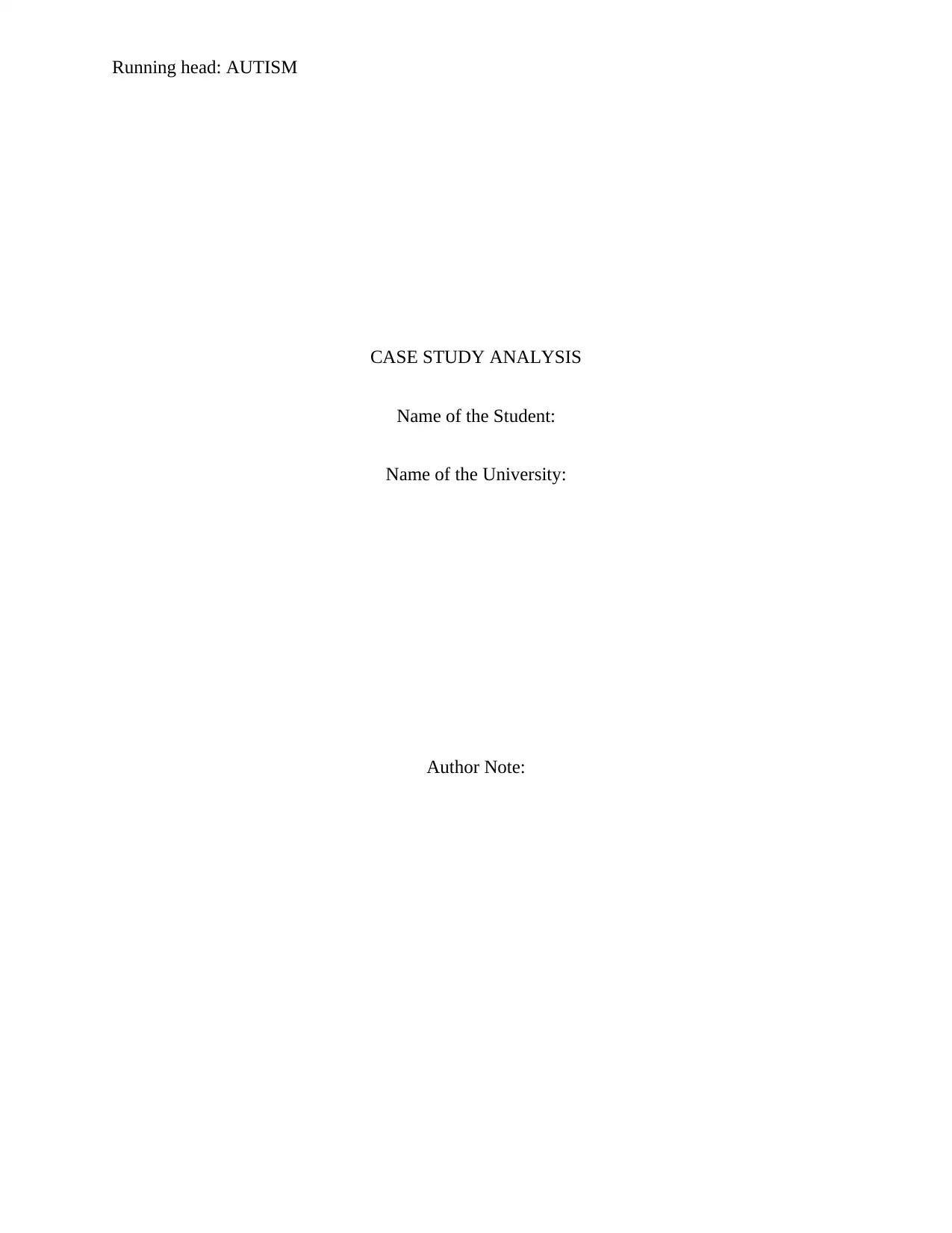
Running head: AUTISM
CASE STUDY ANALYSIS
Name of the Student:
Name of the University:
Author Note:
CASE STUDY ANALYSIS
Name of the Student:
Name of the University:
Author Note:
Paraphrase This Document
Need a fresh take? Get an instant paraphrase of this document with our AI Paraphraser
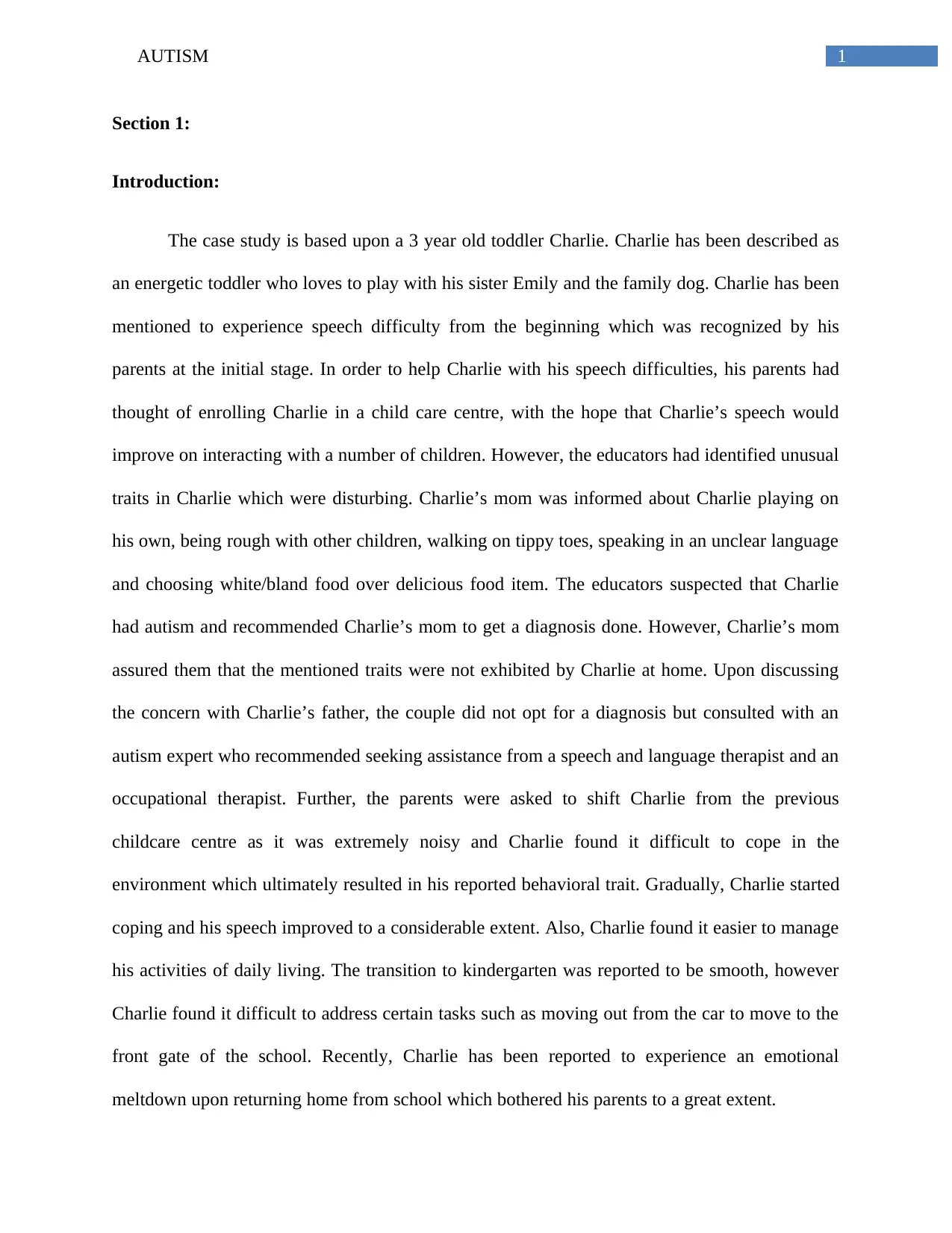
1AUTISM
Section 1:
Introduction:
The case study is based upon a 3 year old toddler Charlie. Charlie has been described as
an energetic toddler who loves to play with his sister Emily and the family dog. Charlie has been
mentioned to experience speech difficulty from the beginning which was recognized by his
parents at the initial stage. In order to help Charlie with his speech difficulties, his parents had
thought of enrolling Charlie in a child care centre, with the hope that Charlie’s speech would
improve on interacting with a number of children. However, the educators had identified unusual
traits in Charlie which were disturbing. Charlie’s mom was informed about Charlie playing on
his own, being rough with other children, walking on tippy toes, speaking in an unclear language
and choosing white/bland food over delicious food item. The educators suspected that Charlie
had autism and recommended Charlie’s mom to get a diagnosis done. However, Charlie’s mom
assured them that the mentioned traits were not exhibited by Charlie at home. Upon discussing
the concern with Charlie’s father, the couple did not opt for a diagnosis but consulted with an
autism expert who recommended seeking assistance from a speech and language therapist and an
occupational therapist. Further, the parents were asked to shift Charlie from the previous
childcare centre as it was extremely noisy and Charlie found it difficult to cope in the
environment which ultimately resulted in his reported behavioral trait. Gradually, Charlie started
coping and his speech improved to a considerable extent. Also, Charlie found it easier to manage
his activities of daily living. The transition to kindergarten was reported to be smooth, however
Charlie found it difficult to address certain tasks such as moving out from the car to move to the
front gate of the school. Recently, Charlie has been reported to experience an emotional
meltdown upon returning home from school which bothered his parents to a great extent.
Section 1:
Introduction:
The case study is based upon a 3 year old toddler Charlie. Charlie has been described as
an energetic toddler who loves to play with his sister Emily and the family dog. Charlie has been
mentioned to experience speech difficulty from the beginning which was recognized by his
parents at the initial stage. In order to help Charlie with his speech difficulties, his parents had
thought of enrolling Charlie in a child care centre, with the hope that Charlie’s speech would
improve on interacting with a number of children. However, the educators had identified unusual
traits in Charlie which were disturbing. Charlie’s mom was informed about Charlie playing on
his own, being rough with other children, walking on tippy toes, speaking in an unclear language
and choosing white/bland food over delicious food item. The educators suspected that Charlie
had autism and recommended Charlie’s mom to get a diagnosis done. However, Charlie’s mom
assured them that the mentioned traits were not exhibited by Charlie at home. Upon discussing
the concern with Charlie’s father, the couple did not opt for a diagnosis but consulted with an
autism expert who recommended seeking assistance from a speech and language therapist and an
occupational therapist. Further, the parents were asked to shift Charlie from the previous
childcare centre as it was extremely noisy and Charlie found it difficult to cope in the
environment which ultimately resulted in his reported behavioral trait. Gradually, Charlie started
coping and his speech improved to a considerable extent. Also, Charlie found it easier to manage
his activities of daily living. The transition to kindergarten was reported to be smooth, however
Charlie found it difficult to address certain tasks such as moving out from the car to move to the
front gate of the school. Recently, Charlie has been reported to experience an emotional
meltdown upon returning home from school which bothered his parents to a great extent.
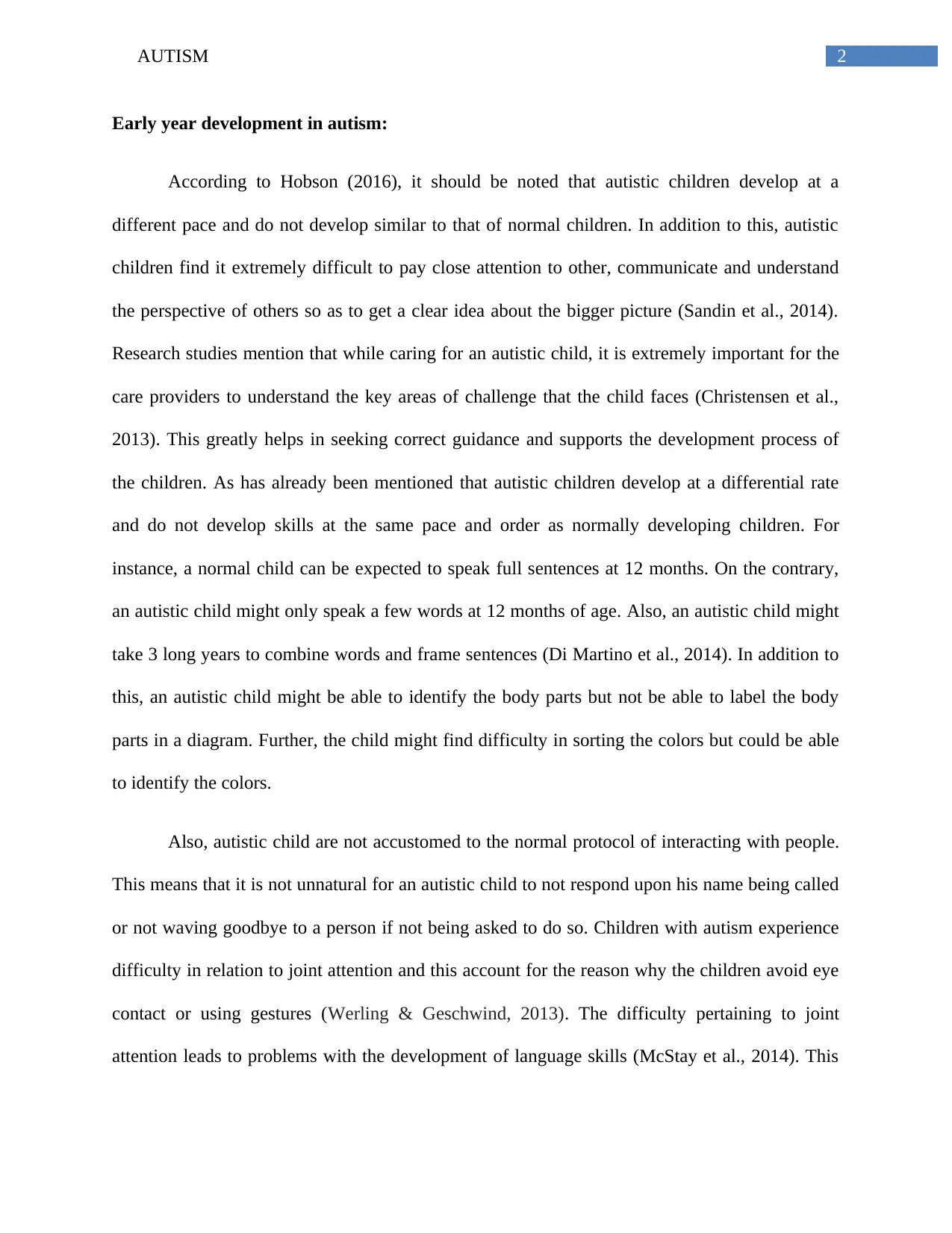
2AUTISM
Early year development in autism:
According to Hobson (2016), it should be noted that autistic children develop at a
different pace and do not develop similar to that of normal children. In addition to this, autistic
children find it extremely difficult to pay close attention to other, communicate and understand
the perspective of others so as to get a clear idea about the bigger picture (Sandin et al., 2014).
Research studies mention that while caring for an autistic child, it is extremely important for the
care providers to understand the key areas of challenge that the child faces (Christensen et al.,
2013). This greatly helps in seeking correct guidance and supports the development process of
the children. As has already been mentioned that autistic children develop at a differential rate
and do not develop skills at the same pace and order as normally developing children. For
instance, a normal child can be expected to speak full sentences at 12 months. On the contrary,
an autistic child might only speak a few words at 12 months of age. Also, an autistic child might
take 3 long years to combine words and frame sentences (Di Martino et al., 2014). In addition to
this, an autistic child might be able to identify the body parts but not be able to label the body
parts in a diagram. Further, the child might find difficulty in sorting the colors but could be able
to identify the colors.
Also, autistic child are not accustomed to the normal protocol of interacting with people.
This means that it is not unnatural for an autistic child to not respond upon his name being called
or not waving goodbye to a person if not being asked to do so. Children with autism experience
difficulty in relation to joint attention and this account for the reason why the children avoid eye
contact or using gestures (Werling & Geschwind, 2013). The difficulty pertaining to joint
attention leads to problems with the development of language skills (McStay et al., 2014). This
Early year development in autism:
According to Hobson (2016), it should be noted that autistic children develop at a
different pace and do not develop similar to that of normal children. In addition to this, autistic
children find it extremely difficult to pay close attention to other, communicate and understand
the perspective of others so as to get a clear idea about the bigger picture (Sandin et al., 2014).
Research studies mention that while caring for an autistic child, it is extremely important for the
care providers to understand the key areas of challenge that the child faces (Christensen et al.,
2013). This greatly helps in seeking correct guidance and supports the development process of
the children. As has already been mentioned that autistic children develop at a differential rate
and do not develop skills at the same pace and order as normally developing children. For
instance, a normal child can be expected to speak full sentences at 12 months. On the contrary,
an autistic child might only speak a few words at 12 months of age. Also, an autistic child might
take 3 long years to combine words and frame sentences (Di Martino et al., 2014). In addition to
this, an autistic child might be able to identify the body parts but not be able to label the body
parts in a diagram. Further, the child might find difficulty in sorting the colors but could be able
to identify the colors.
Also, autistic child are not accustomed to the normal protocol of interacting with people.
This means that it is not unnatural for an autistic child to not respond upon his name being called
or not waving goodbye to a person if not being asked to do so. Children with autism experience
difficulty in relation to joint attention and this account for the reason why the children avoid eye
contact or using gestures (Werling & Geschwind, 2013). The difficulty pertaining to joint
attention leads to problems with the development of language skills (McStay et al., 2014). This
⊘ This is a preview!⊘
Do you want full access?
Subscribe today to unlock all pages.

Trusted by 1+ million students worldwide
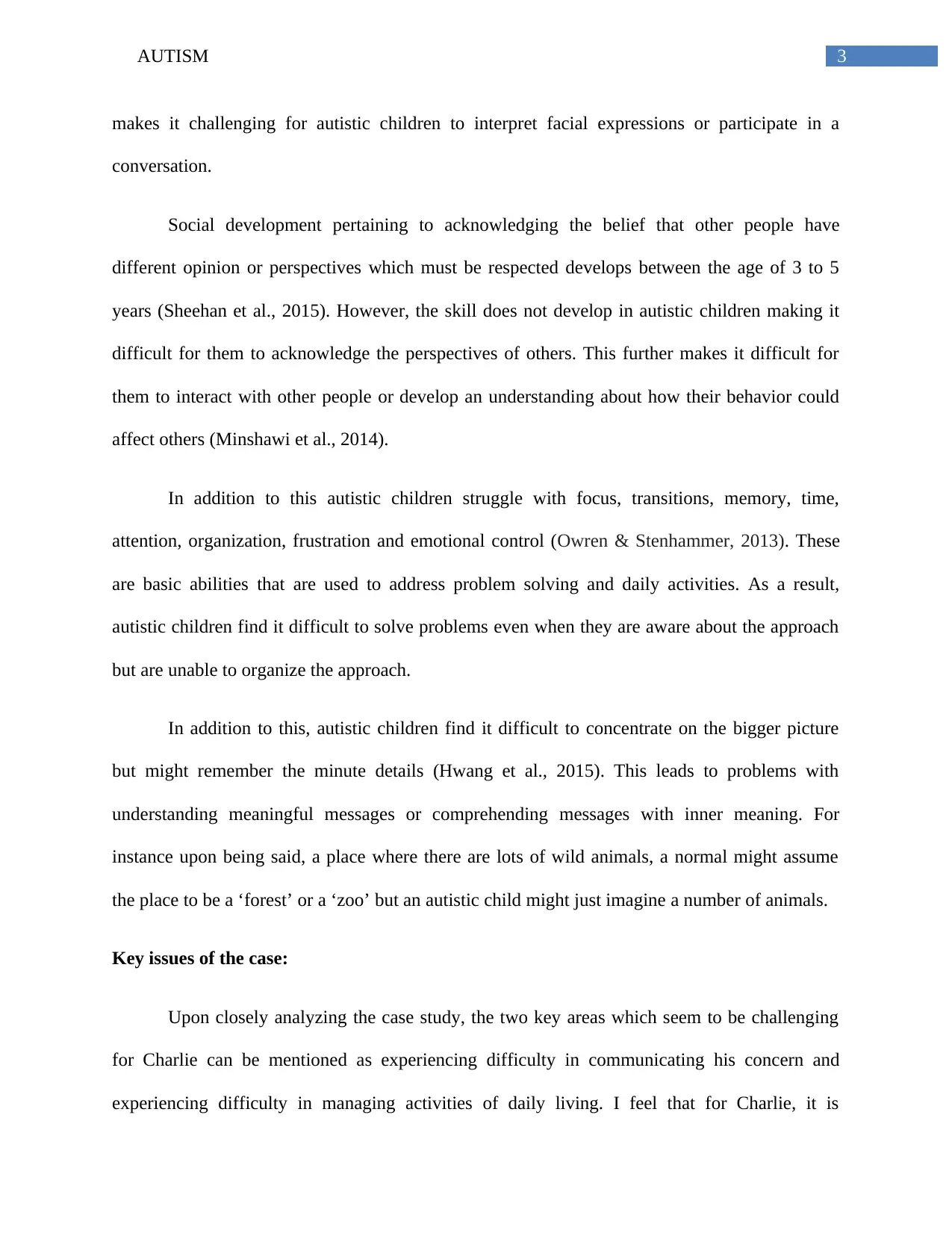
3AUTISM
makes it challenging for autistic children to interpret facial expressions or participate in a
conversation.
Social development pertaining to acknowledging the belief that other people have
different opinion or perspectives which must be respected develops between the age of 3 to 5
years (Sheehan et al., 2015). However, the skill does not develop in autistic children making it
difficult for them to acknowledge the perspectives of others. This further makes it difficult for
them to interact with other people or develop an understanding about how their behavior could
affect others (Minshawi et al., 2014).
In addition to this autistic children struggle with focus, transitions, memory, time,
attention, organization, frustration and emotional control (Owren & Stenhammer, 2013). These
are basic abilities that are used to address problem solving and daily activities. As a result,
autistic children find it difficult to solve problems even when they are aware about the approach
but are unable to organize the approach.
In addition to this, autistic children find it difficult to concentrate on the bigger picture
but might remember the minute details (Hwang et al., 2015). This leads to problems with
understanding meaningful messages or comprehending messages with inner meaning. For
instance upon being said, a place where there are lots of wild animals, a normal might assume
the place to be a ‘forest’ or a ‘zoo’ but an autistic child might just imagine a number of animals.
Key issues of the case:
Upon closely analyzing the case study, the two key areas which seem to be challenging
for Charlie can be mentioned as experiencing difficulty in communicating his concern and
experiencing difficulty in managing activities of daily living. I feel that for Charlie, it is
makes it challenging for autistic children to interpret facial expressions or participate in a
conversation.
Social development pertaining to acknowledging the belief that other people have
different opinion or perspectives which must be respected develops between the age of 3 to 5
years (Sheehan et al., 2015). However, the skill does not develop in autistic children making it
difficult for them to acknowledge the perspectives of others. This further makes it difficult for
them to interact with other people or develop an understanding about how their behavior could
affect others (Minshawi et al., 2014).
In addition to this autistic children struggle with focus, transitions, memory, time,
attention, organization, frustration and emotional control (Owren & Stenhammer, 2013). These
are basic abilities that are used to address problem solving and daily activities. As a result,
autistic children find it difficult to solve problems even when they are aware about the approach
but are unable to organize the approach.
In addition to this, autistic children find it difficult to concentrate on the bigger picture
but might remember the minute details (Hwang et al., 2015). This leads to problems with
understanding meaningful messages or comprehending messages with inner meaning. For
instance upon being said, a place where there are lots of wild animals, a normal might assume
the place to be a ‘forest’ or a ‘zoo’ but an autistic child might just imagine a number of animals.
Key issues of the case:
Upon closely analyzing the case study, the two key areas which seem to be challenging
for Charlie can be mentioned as experiencing difficulty in communicating his concern and
experiencing difficulty in managing activities of daily living. I feel that for Charlie, it is
Paraphrase This Document
Need a fresh take? Get an instant paraphrase of this document with our AI Paraphraser
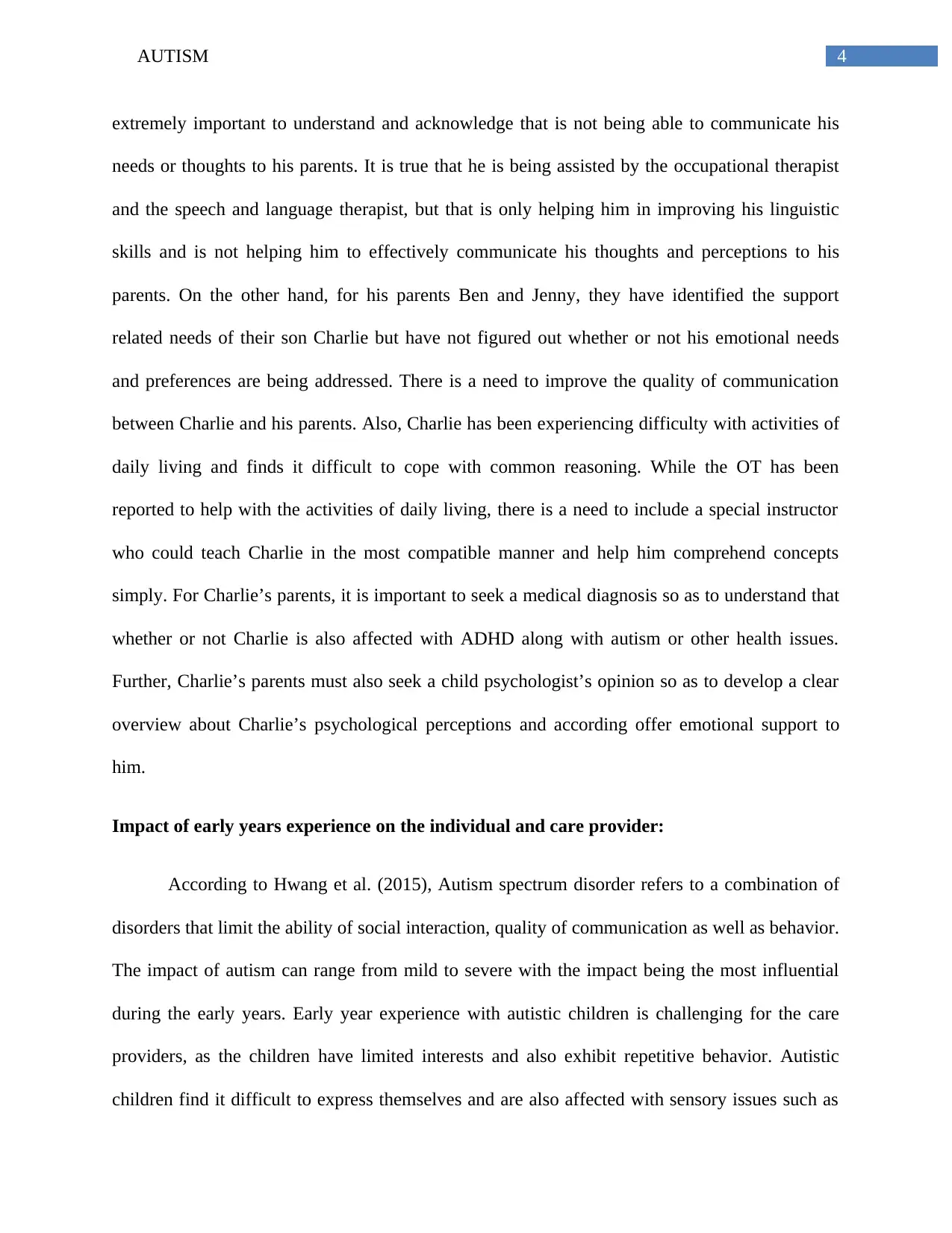
4AUTISM
extremely important to understand and acknowledge that is not being able to communicate his
needs or thoughts to his parents. It is true that he is being assisted by the occupational therapist
and the speech and language therapist, but that is only helping him in improving his linguistic
skills and is not helping him to effectively communicate his thoughts and perceptions to his
parents. On the other hand, for his parents Ben and Jenny, they have identified the support
related needs of their son Charlie but have not figured out whether or not his emotional needs
and preferences are being addressed. There is a need to improve the quality of communication
between Charlie and his parents. Also, Charlie has been experiencing difficulty with activities of
daily living and finds it difficult to cope with common reasoning. While the OT has been
reported to help with the activities of daily living, there is a need to include a special instructor
who could teach Charlie in the most compatible manner and help him comprehend concepts
simply. For Charlie’s parents, it is important to seek a medical diagnosis so as to understand that
whether or not Charlie is also affected with ADHD along with autism or other health issues.
Further, Charlie’s parents must also seek a child psychologist’s opinion so as to develop a clear
overview about Charlie’s psychological perceptions and according offer emotional support to
him.
Impact of early years experience on the individual and care provider:
According to Hwang et al. (2015), Autism spectrum disorder refers to a combination of
disorders that limit the ability of social interaction, quality of communication as well as behavior.
The impact of autism can range from mild to severe with the impact being the most influential
during the early years. Early year experience with autistic children is challenging for the care
providers, as the children have limited interests and also exhibit repetitive behavior. Autistic
children find it difficult to express themselves and are also affected with sensory issues such as
extremely important to understand and acknowledge that is not being able to communicate his
needs or thoughts to his parents. It is true that he is being assisted by the occupational therapist
and the speech and language therapist, but that is only helping him in improving his linguistic
skills and is not helping him to effectively communicate his thoughts and perceptions to his
parents. On the other hand, for his parents Ben and Jenny, they have identified the support
related needs of their son Charlie but have not figured out whether or not his emotional needs
and preferences are being addressed. There is a need to improve the quality of communication
between Charlie and his parents. Also, Charlie has been experiencing difficulty with activities of
daily living and finds it difficult to cope with common reasoning. While the OT has been
reported to help with the activities of daily living, there is a need to include a special instructor
who could teach Charlie in the most compatible manner and help him comprehend concepts
simply. For Charlie’s parents, it is important to seek a medical diagnosis so as to understand that
whether or not Charlie is also affected with ADHD along with autism or other health issues.
Further, Charlie’s parents must also seek a child psychologist’s opinion so as to develop a clear
overview about Charlie’s psychological perceptions and according offer emotional support to
him.
Impact of early years experience on the individual and care provider:
According to Hwang et al. (2015), Autism spectrum disorder refers to a combination of
disorders that limit the ability of social interaction, quality of communication as well as behavior.
The impact of autism can range from mild to severe with the impact being the most influential
during the early years. Early year experience with autistic children is challenging for the care
providers, as the children have limited interests and also exhibit repetitive behavior. Autistic
children find it difficult to express themselves and are also affected with sensory issues such as
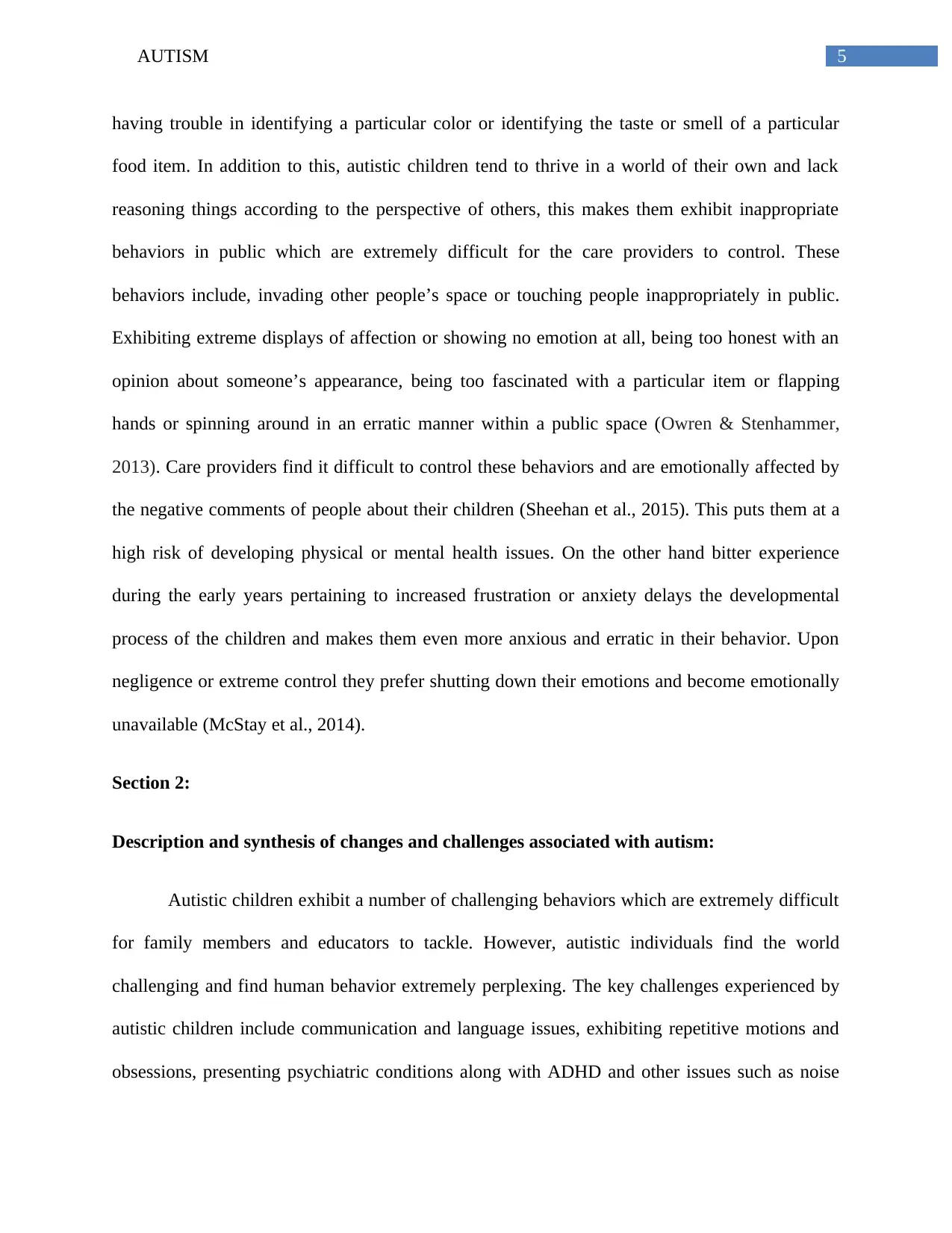
5AUTISM
having trouble in identifying a particular color or identifying the taste or smell of a particular
food item. In addition to this, autistic children tend to thrive in a world of their own and lack
reasoning things according to the perspective of others, this makes them exhibit inappropriate
behaviors in public which are extremely difficult for the care providers to control. These
behaviors include, invading other people’s space or touching people inappropriately in public.
Exhibiting extreme displays of affection or showing no emotion at all, being too honest with an
opinion about someone’s appearance, being too fascinated with a particular item or flapping
hands or spinning around in an erratic manner within a public space (Owren & Stenhammer,
2013). Care providers find it difficult to control these behaviors and are emotionally affected by
the negative comments of people about their children (Sheehan et al., 2015). This puts them at a
high risk of developing physical or mental health issues. On the other hand bitter experience
during the early years pertaining to increased frustration or anxiety delays the developmental
process of the children and makes them even more anxious and erratic in their behavior. Upon
negligence or extreme control they prefer shutting down their emotions and become emotionally
unavailable (McStay et al., 2014).
Section 2:
Description and synthesis of changes and challenges associated with autism:
Autistic children exhibit a number of challenging behaviors which are extremely difficult
for family members and educators to tackle. However, autistic individuals find the world
challenging and find human behavior extremely perplexing. The key challenges experienced by
autistic children include communication and language issues, exhibiting repetitive motions and
obsessions, presenting psychiatric conditions along with ADHD and other issues such as noise
having trouble in identifying a particular color or identifying the taste or smell of a particular
food item. In addition to this, autistic children tend to thrive in a world of their own and lack
reasoning things according to the perspective of others, this makes them exhibit inappropriate
behaviors in public which are extremely difficult for the care providers to control. These
behaviors include, invading other people’s space or touching people inappropriately in public.
Exhibiting extreme displays of affection or showing no emotion at all, being too honest with an
opinion about someone’s appearance, being too fascinated with a particular item or flapping
hands or spinning around in an erratic manner within a public space (Owren & Stenhammer,
2013). Care providers find it difficult to control these behaviors and are emotionally affected by
the negative comments of people about their children (Sheehan et al., 2015). This puts them at a
high risk of developing physical or mental health issues. On the other hand bitter experience
during the early years pertaining to increased frustration or anxiety delays the developmental
process of the children and makes them even more anxious and erratic in their behavior. Upon
negligence or extreme control they prefer shutting down their emotions and become emotionally
unavailable (McStay et al., 2014).
Section 2:
Description and synthesis of changes and challenges associated with autism:
Autistic children exhibit a number of challenging behaviors which are extremely difficult
for family members and educators to tackle. However, autistic individuals find the world
challenging and find human behavior extremely perplexing. The key challenges experienced by
autistic children include communication and language issues, exhibiting repetitive motions and
obsessions, presenting psychiatric conditions along with ADHD and other issues such as noise
⊘ This is a preview!⊘
Do you want full access?
Subscribe today to unlock all pages.

Trusted by 1+ million students worldwide
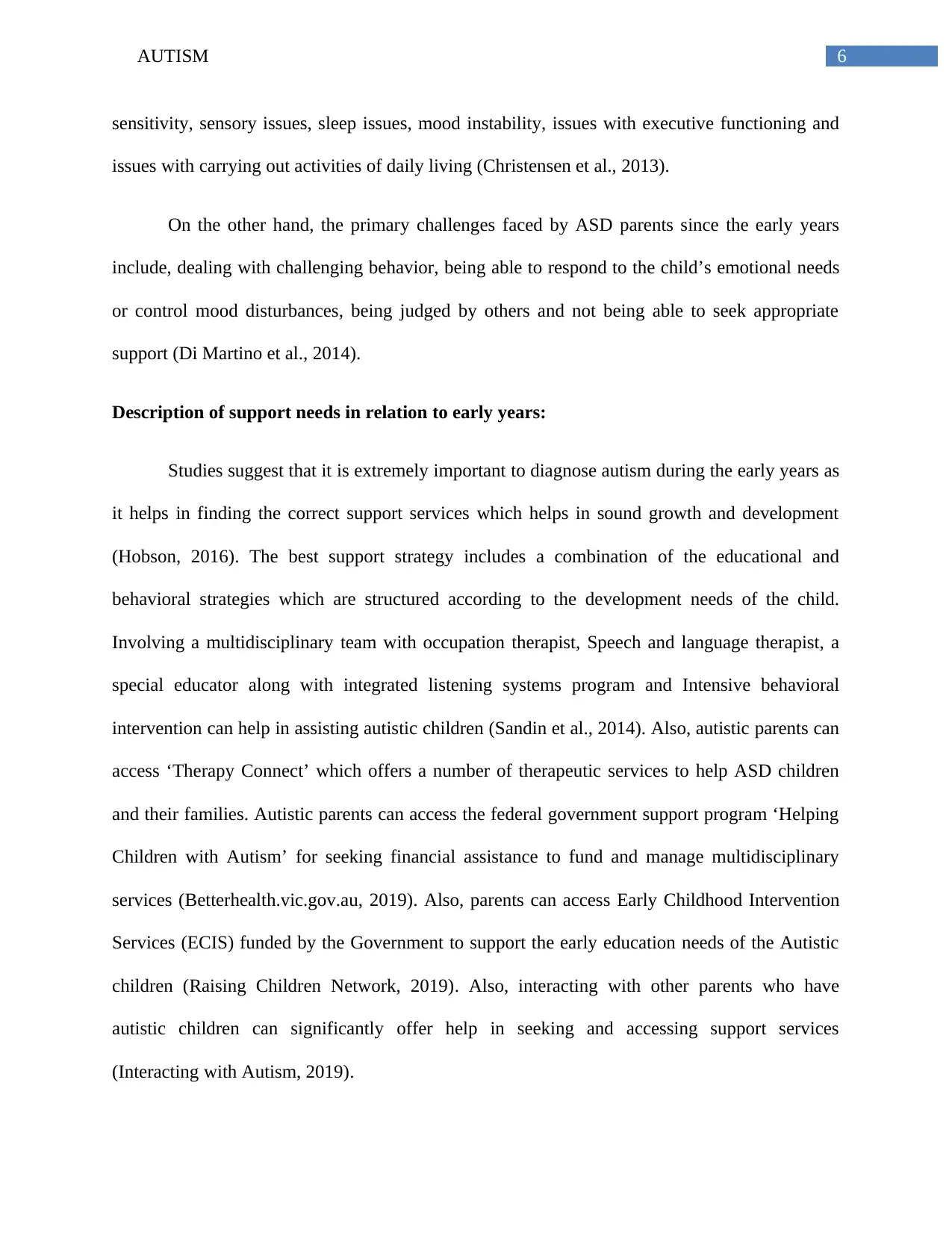
6AUTISM
sensitivity, sensory issues, sleep issues, mood instability, issues with executive functioning and
issues with carrying out activities of daily living (Christensen et al., 2013).
On the other hand, the primary challenges faced by ASD parents since the early years
include, dealing with challenging behavior, being able to respond to the child’s emotional needs
or control mood disturbances, being judged by others and not being able to seek appropriate
support (Di Martino et al., 2014).
Description of support needs in relation to early years:
Studies suggest that it is extremely important to diagnose autism during the early years as
it helps in finding the correct support services which helps in sound growth and development
(Hobson, 2016). The best support strategy includes a combination of the educational and
behavioral strategies which are structured according to the development needs of the child.
Involving a multidisciplinary team with occupation therapist, Speech and language therapist, a
special educator along with integrated listening systems program and Intensive behavioral
intervention can help in assisting autistic children (Sandin et al., 2014). Also, autistic parents can
access ‘Therapy Connect’ which offers a number of therapeutic services to help ASD children
and their families. Autistic parents can access the federal government support program ‘Helping
Children with Autism’ for seeking financial assistance to fund and manage multidisciplinary
services (Betterhealth.vic.gov.au, 2019). Also, parents can access Early Childhood Intervention
Services (ECIS) funded by the Government to support the early education needs of the Autistic
children (Raising Children Network, 2019). Also, interacting with other parents who have
autistic children can significantly offer help in seeking and accessing support services
(Interacting with Autism, 2019).
sensitivity, sensory issues, sleep issues, mood instability, issues with executive functioning and
issues with carrying out activities of daily living (Christensen et al., 2013).
On the other hand, the primary challenges faced by ASD parents since the early years
include, dealing with challenging behavior, being able to respond to the child’s emotional needs
or control mood disturbances, being judged by others and not being able to seek appropriate
support (Di Martino et al., 2014).
Description of support needs in relation to early years:
Studies suggest that it is extremely important to diagnose autism during the early years as
it helps in finding the correct support services which helps in sound growth and development
(Hobson, 2016). The best support strategy includes a combination of the educational and
behavioral strategies which are structured according to the development needs of the child.
Involving a multidisciplinary team with occupation therapist, Speech and language therapist, a
special educator along with integrated listening systems program and Intensive behavioral
intervention can help in assisting autistic children (Sandin et al., 2014). Also, autistic parents can
access ‘Therapy Connect’ which offers a number of therapeutic services to help ASD children
and their families. Autistic parents can access the federal government support program ‘Helping
Children with Autism’ for seeking financial assistance to fund and manage multidisciplinary
services (Betterhealth.vic.gov.au, 2019). Also, parents can access Early Childhood Intervention
Services (ECIS) funded by the Government to support the early education needs of the Autistic
children (Raising Children Network, 2019). Also, interacting with other parents who have
autistic children can significantly offer help in seeking and accessing support services
(Interacting with Autism, 2019).
Paraphrase This Document
Need a fresh take? Get an instant paraphrase of this document with our AI Paraphraser
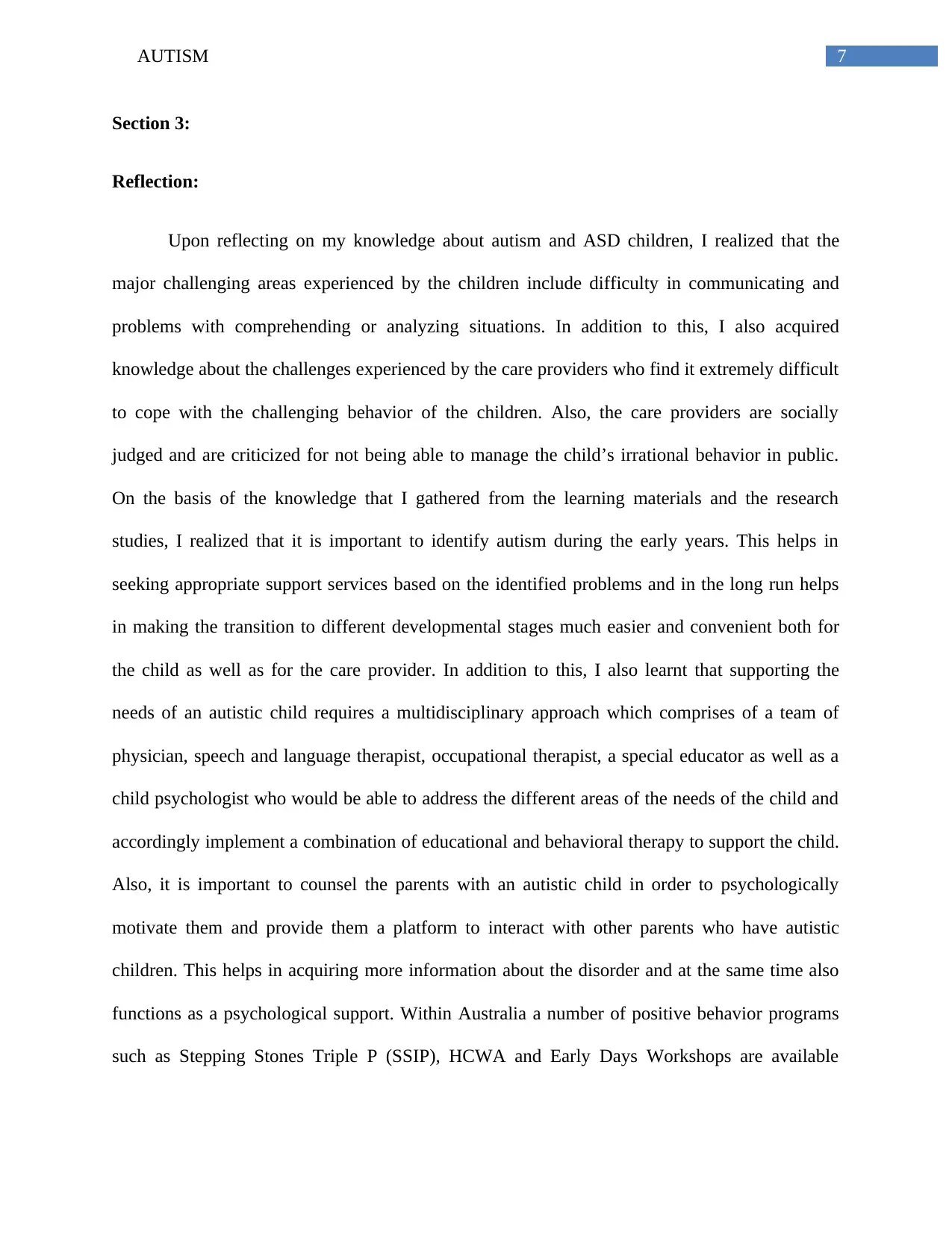
7AUTISM
Section 3:
Reflection:
Upon reflecting on my knowledge about autism and ASD children, I realized that the
major challenging areas experienced by the children include difficulty in communicating and
problems with comprehending or analyzing situations. In addition to this, I also acquired
knowledge about the challenges experienced by the care providers who find it extremely difficult
to cope with the challenging behavior of the children. Also, the care providers are socially
judged and are criticized for not being able to manage the child’s irrational behavior in public.
On the basis of the knowledge that I gathered from the learning materials and the research
studies, I realized that it is important to identify autism during the early years. This helps in
seeking appropriate support services based on the identified problems and in the long run helps
in making the transition to different developmental stages much easier and convenient both for
the child as well as for the care provider. In addition to this, I also learnt that supporting the
needs of an autistic child requires a multidisciplinary approach which comprises of a team of
physician, speech and language therapist, occupational therapist, a special educator as well as a
child psychologist who would be able to address the different areas of the needs of the child and
accordingly implement a combination of educational and behavioral therapy to support the child.
Also, it is important to counsel the parents with an autistic child in order to psychologically
motivate them and provide them a platform to interact with other parents who have autistic
children. This helps in acquiring more information about the disorder and at the same time also
functions as a psychological support. Within Australia a number of positive behavior programs
such as Stepping Stones Triple P (SSIP), HCWA and Early Days Workshops are available
Section 3:
Reflection:
Upon reflecting on my knowledge about autism and ASD children, I realized that the
major challenging areas experienced by the children include difficulty in communicating and
problems with comprehending or analyzing situations. In addition to this, I also acquired
knowledge about the challenges experienced by the care providers who find it extremely difficult
to cope with the challenging behavior of the children. Also, the care providers are socially
judged and are criticized for not being able to manage the child’s irrational behavior in public.
On the basis of the knowledge that I gathered from the learning materials and the research
studies, I realized that it is important to identify autism during the early years. This helps in
seeking appropriate support services based on the identified problems and in the long run helps
in making the transition to different developmental stages much easier and convenient both for
the child as well as for the care provider. In addition to this, I also learnt that supporting the
needs of an autistic child requires a multidisciplinary approach which comprises of a team of
physician, speech and language therapist, occupational therapist, a special educator as well as a
child psychologist who would be able to address the different areas of the needs of the child and
accordingly implement a combination of educational and behavioral therapy to support the child.
Also, it is important to counsel the parents with an autistic child in order to psychologically
motivate them and provide them a platform to interact with other parents who have autistic
children. This helps in acquiring more information about the disorder and at the same time also
functions as a psychological support. Within Australia a number of positive behavior programs
such as Stepping Stones Triple P (SSIP), HCWA and Early Days Workshops are available

8AUTISM
(Raising Children Network, 2019) These strategies are designed to provide assistance to parents
in the form of ideas to manage the challenging behavior of their autistic children.
(Raising Children Network, 2019) These strategies are designed to provide assistance to parents
in the form of ideas to manage the challenging behavior of their autistic children.
⊘ This is a preview!⊘
Do you want full access?
Subscribe today to unlock all pages.

Trusted by 1+ million students worldwide
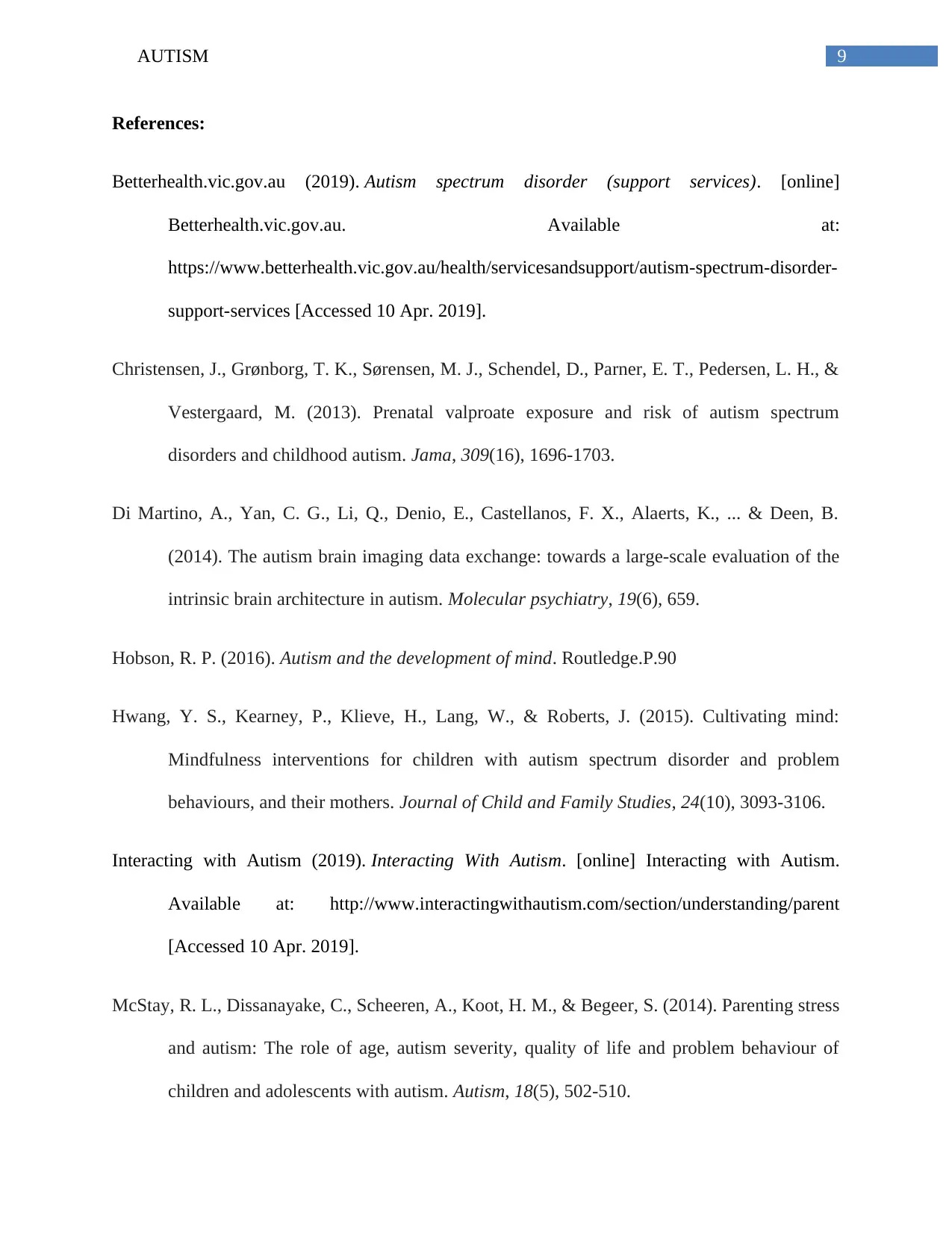
9AUTISM
References:
Betterhealth.vic.gov.au (2019). Autism spectrum disorder (support services). [online]
Betterhealth.vic.gov.au. Available at:
https://www.betterhealth.vic.gov.au/health/servicesandsupport/autism-spectrum-disorder-
support-services [Accessed 10 Apr. 2019].
Christensen, J., Grønborg, T. K., Sørensen, M. J., Schendel, D., Parner, E. T., Pedersen, L. H., &
Vestergaard, M. (2013). Prenatal valproate exposure and risk of autism spectrum
disorders and childhood autism. Jama, 309(16), 1696-1703.
Di Martino, A., Yan, C. G., Li, Q., Denio, E., Castellanos, F. X., Alaerts, K., ... & Deen, B.
(2014). The autism brain imaging data exchange: towards a large-scale evaluation of the
intrinsic brain architecture in autism. Molecular psychiatry, 19(6), 659.
Hobson, R. P. (2016). Autism and the development of mind. Routledge.P.90
Hwang, Y. S., Kearney, P., Klieve, H., Lang, W., & Roberts, J. (2015). Cultivating mind:
Mindfulness interventions for children with autism spectrum disorder and problem
behaviours, and their mothers. Journal of Child and Family Studies, 24(10), 3093-3106.
Interacting with Autism (2019). Interacting With Autism. [online] Interacting with Autism.
Available at: http://www.interactingwithautism.com/section/understanding/parent
[Accessed 10 Apr. 2019].
McStay, R. L., Dissanayake, C., Scheeren, A., Koot, H. M., & Begeer, S. (2014). Parenting stress
and autism: The role of age, autism severity, quality of life and problem behaviour of
children and adolescents with autism. Autism, 18(5), 502-510.
References:
Betterhealth.vic.gov.au (2019). Autism spectrum disorder (support services). [online]
Betterhealth.vic.gov.au. Available at:
https://www.betterhealth.vic.gov.au/health/servicesandsupport/autism-spectrum-disorder-
support-services [Accessed 10 Apr. 2019].
Christensen, J., Grønborg, T. K., Sørensen, M. J., Schendel, D., Parner, E. T., Pedersen, L. H., &
Vestergaard, M. (2013). Prenatal valproate exposure and risk of autism spectrum
disorders and childhood autism. Jama, 309(16), 1696-1703.
Di Martino, A., Yan, C. G., Li, Q., Denio, E., Castellanos, F. X., Alaerts, K., ... & Deen, B.
(2014). The autism brain imaging data exchange: towards a large-scale evaluation of the
intrinsic brain architecture in autism. Molecular psychiatry, 19(6), 659.
Hobson, R. P. (2016). Autism and the development of mind. Routledge.P.90
Hwang, Y. S., Kearney, P., Klieve, H., Lang, W., & Roberts, J. (2015). Cultivating mind:
Mindfulness interventions for children with autism spectrum disorder and problem
behaviours, and their mothers. Journal of Child and Family Studies, 24(10), 3093-3106.
Interacting with Autism (2019). Interacting With Autism. [online] Interacting with Autism.
Available at: http://www.interactingwithautism.com/section/understanding/parent
[Accessed 10 Apr. 2019].
McStay, R. L., Dissanayake, C., Scheeren, A., Koot, H. M., & Begeer, S. (2014). Parenting stress
and autism: The role of age, autism severity, quality of life and problem behaviour of
children and adolescents with autism. Autism, 18(5), 502-510.
Paraphrase This Document
Need a fresh take? Get an instant paraphrase of this document with our AI Paraphraser
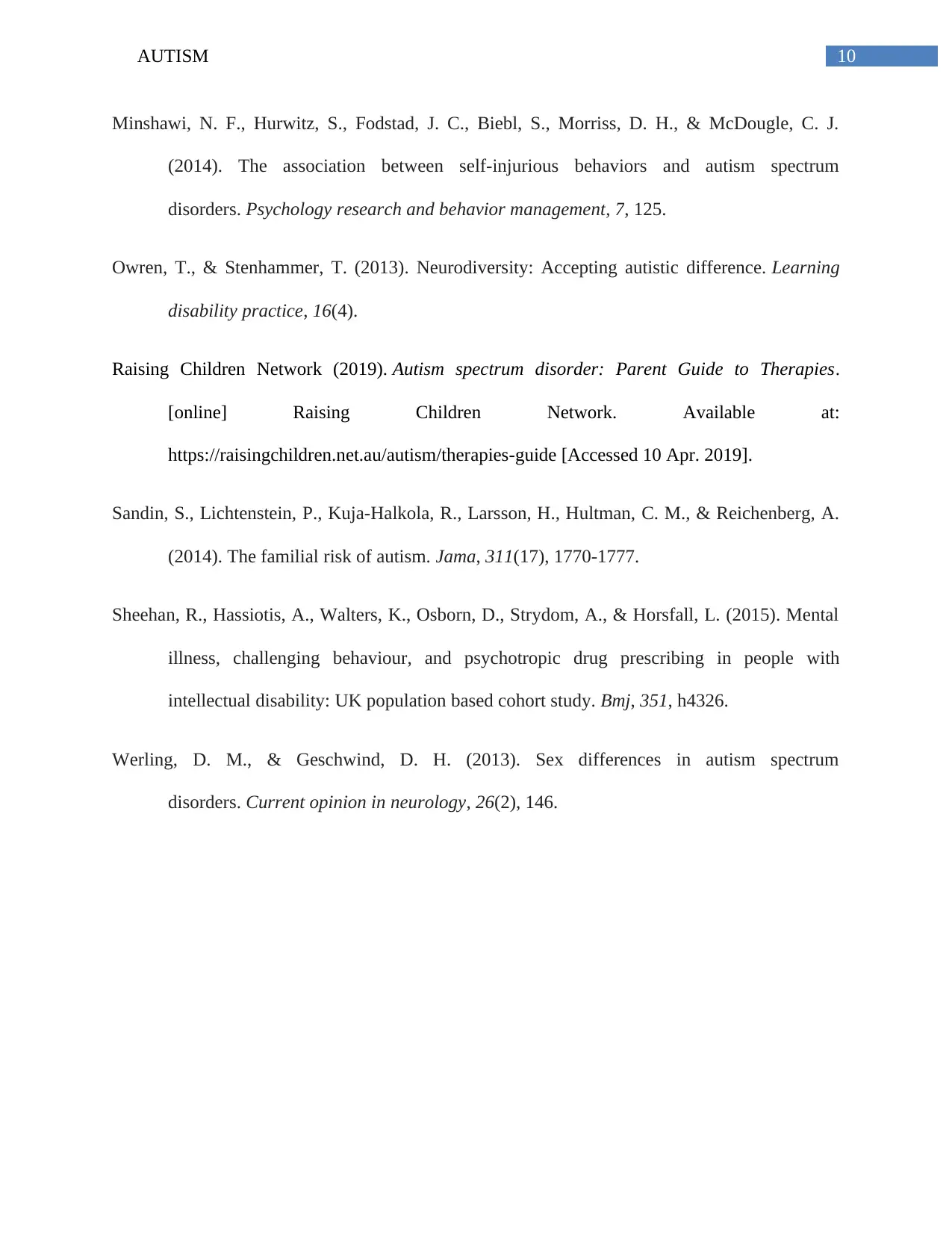
10AUTISM
Minshawi, N. F., Hurwitz, S., Fodstad, J. C., Biebl, S., Morriss, D. H., & McDougle, C. J.
(2014). The association between self-injurious behaviors and autism spectrum
disorders. Psychology research and behavior management, 7, 125.
Owren, T., & Stenhammer, T. (2013). Neurodiversity: Accepting autistic difference. Learning
disability practice, 16(4).
Raising Children Network (2019). Autism spectrum disorder: Parent Guide to Therapies.
[online] Raising Children Network. Available at:
https://raisingchildren.net.au/autism/therapies-guide [Accessed 10 Apr. 2019].
Sandin, S., Lichtenstein, P., Kuja-Halkola, R., Larsson, H., Hultman, C. M., & Reichenberg, A.
(2014). The familial risk of autism. Jama, 311(17), 1770-1777.
Sheehan, R., Hassiotis, A., Walters, K., Osborn, D., Strydom, A., & Horsfall, L. (2015). Mental
illness, challenging behaviour, and psychotropic drug prescribing in people with
intellectual disability: UK population based cohort study. Bmj, 351, h4326.
Werling, D. M., & Geschwind, D. H. (2013). Sex differences in autism spectrum
disorders. Current opinion in neurology, 26(2), 146.
Minshawi, N. F., Hurwitz, S., Fodstad, J. C., Biebl, S., Morriss, D. H., & McDougle, C. J.
(2014). The association between self-injurious behaviors and autism spectrum
disorders. Psychology research and behavior management, 7, 125.
Owren, T., & Stenhammer, T. (2013). Neurodiversity: Accepting autistic difference. Learning
disability practice, 16(4).
Raising Children Network (2019). Autism spectrum disorder: Parent Guide to Therapies.
[online] Raising Children Network. Available at:
https://raisingchildren.net.au/autism/therapies-guide [Accessed 10 Apr. 2019].
Sandin, S., Lichtenstein, P., Kuja-Halkola, R., Larsson, H., Hultman, C. M., & Reichenberg, A.
(2014). The familial risk of autism. Jama, 311(17), 1770-1777.
Sheehan, R., Hassiotis, A., Walters, K., Osborn, D., Strydom, A., & Horsfall, L. (2015). Mental
illness, challenging behaviour, and psychotropic drug prescribing in people with
intellectual disability: UK population based cohort study. Bmj, 351, h4326.
Werling, D. M., & Geschwind, D. H. (2013). Sex differences in autism spectrum
disorders. Current opinion in neurology, 26(2), 146.
1 out of 11
Your All-in-One AI-Powered Toolkit for Academic Success.
+13062052269
info@desklib.com
Available 24*7 on WhatsApp / Email
![[object Object]](/_next/static/media/star-bottom.7253800d.svg)
Unlock your academic potential
Copyright © 2020–2026 A2Z Services. All Rights Reserved. Developed and managed by ZUCOL.


